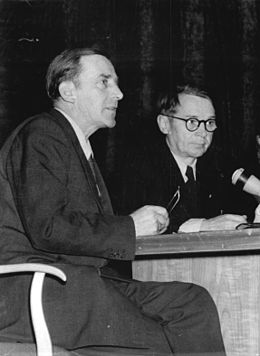Theo Harych
Theo Harych (born December 19, 1903 in Doruchow , Posen , † February 22, 1958 in East Berlin ) was a German writer .

Life
Theo Harych was the son of a farm laborer. From 1910 to 1918 he worked as a herding boy and servant in Silesia ; He broke off attending a one-class elementary school in 1916. In 1919 he went to Central Germany , where he worked in a sugar factory and in a lignite mine in Müelte . As a member of the miners' union , he took part in the Central German uprising in the Geiseltal in 1921 . In 1923 he attended a driving and servant school in Halle ( Saale ); then he was asWanderer in Saxony on the move. In 1925 he was a servant to a nobleman for a short time , but was dismissed without notice after five months for communist propaganda. Another hike followed and a time as a driver in Berlin . From 1930 to 1936 Harych was unemployed , from 1936 he worked as an auxiliary fitter . From 1936 to 1944 he carried out wage transports with his own delivery truck . Although he was drafted into the Wehrmacht in 1944, he was assigned to a so-called " ear company " due to an ear condition and was soon released again.
After the Second World War he worked again as a driver in East Berlin . His literary talent was discovered in 1950 and enabled him to exist as a freelance writer . Harych was a member of the GDR Writers' Association and received the Heinrich Mann Prize in 1954 . He died by suicide .
In addition to a children's book, Theo Harych wrote three novels , of which Behind the Black Forests describes Harych's poor childhood and adolescence. The themes of Im Geiseltal are the misery and rebellion of the workers in the central German lignite mining area up to the uprising of 1921; The third novel In the Name of the People is the documentary processing of the " Jakubowski Case ", an authentic judicial scandal , the victim of which was a Polish farm worker in the 1920s.
Although Theo Harych embodied the ideal image of the writing worker cultivated in the early GDR , his natural narrative talent and documentary realism surpassed most representatives of state-funded proletarian literature .
Fonts
- Behind the black woods. Berlin 1951, new edition Berlin 2015 pdf ISBN 978-3-923211-64-7 .
- Raven spook. Story in: New German storytellers. 1951.
- Barbel and Lothar's most beautiful day. Berlin 1952.
- In the Geiseltal. Berlin 1952.
- In the name of the people? Berlin 1958.
literature
- Jürgen Serke : At home in exile. Poets who stayed in the GDR on their own initiative. Munich; Zurich: Piper, 1998. ISBN 3-492-03981-2 .
- Carsten Wurm: Harych, Theo . In: Who was who in the GDR? 5th edition. Volume 1. Ch. Links, Berlin 2010, ISBN 978-3-86153-561-4 .
Web links
- Literature by and about Theo Harych in the catalog of the German National Library
- Theo Harych Archive in the Archive of the Academy of Arts, Berlin
| personal data | |
|---|---|
| SURNAME | Harych, Theo |
| BRIEF DESCRIPTION | German writer |
| DATE OF BIRTH | December 19, 1903 |
| PLACE OF BIRTH | Doruchow , Poznan |
| DATE OF DEATH | February 22, 1958 |
| Place of death | East Berlin |